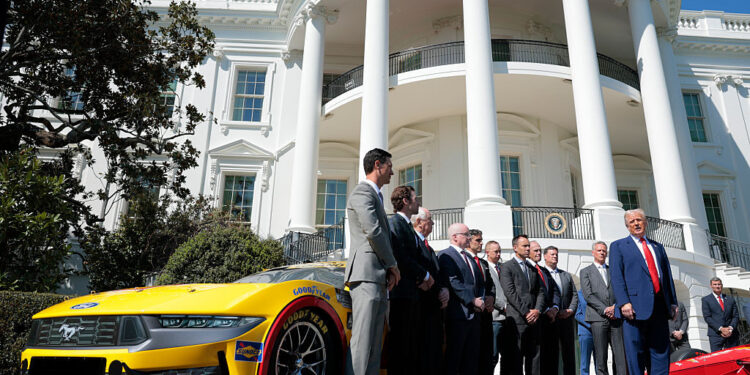ANALYSIS — President Donald Trump made clear this week his second-term strategy for governing is based largely on his own gut instincts, but stock markets have rejected that unorthodox approach and congressional Democrats call it reckless.
Democrats have criticized Trump over what they say is a seat-of-the-pants stewardship of the economy, with one lawmaker contending this week that the president has managed his tariffs push using mostly “vibes.” Based on Trump’s own words, he might not be that far off.
But where Democrats see a lack of strategic thinking, Trump and his top aides describe him as a once-in-a-lifetime decision-maker with the power to have others bend to his will. The president might alter course just hours after appearing to double down on a hard-line policy, but at the White House, officials say it’s the preferred approach — even if it did send stock markets on a wild up-and-mostly-down ride.
“We’re a by-the-minute operation here,” a White House official said this week. “That’s how we roll. That’s just how the president likes to operate.”
In several exchanges Wednesday with CQ Roll Call, Trump pulled back the curtain on his go-with-his-gut method on issues such as trade and foreign policy.
Asked if he might consider granting exemptions from his tariffs to large American companies that have taken a beating by stock markets since he announced his tariffs on April 2, Trump responded: “As time goes by, we’re going to take a look at it. There are some that have been hard. There are some that, by the nature of the company, get hit a little bit harder.”
How would he go about deciding which — or if any — companies deserve some duties relief?
“Instinctively, more than anything else,” the president said. “You almost can’t take a pencil to paper. It’s really more of an instinct, I think, than anything else.”
Asked later by the same reporter about his administration’s direct talks with Iran that are slated to begin on Sunday, Trump referred to the negotiations as the start of a “process,” but added: “They can’t have a nuclear weapon.”
“But with Iran, yeah, if it requires military [action], we’re going to have military,” he said in the Oval Office. “Israel will, obviously, be … the leader of that. No one leads us. We do what we want.”
How would he determine whether the talks with Iran had run their course, should the two sides fail to reach an agreement on the Islamic republic’s nuclear arms ambitions?
“I don’t want to be specific. But when you start talks, you know if they’re going along well or not,” Trump said. “And I would say the conclusion would be when I think they’re not going along well. And that’s just a feeling.”
Trump and his aides describe his approach as akin to a skilled poker player: He evaluates his hand and what’s going on around the table — and when circumstances or his cards change, he acts accordingly.

Democrats, however, say that’s a great way to cause a global recession and torch America’s decades- and centuries-old global alliances — and potentially do permanent damage to Washington’s trustworthiness and reputation.
“Imagine spending hours defending Trump’s garbage tariff policy — including to me — only for your boss to reverse it an hour later,” House Ways and Means member Brendan F. Boyle, D-Pa., wrote on social media after an exchange with Trump’s top trade negotiator, Jamieson Greer, at a Wednesday hearing.
“No strategy. Just vibes, sycophancy, and a thirst for power,” Boyle wrote of the president. “These people will torch the country if it keeps them in charge.”
Like some other Democrats, Boyle acknowledged Trump’s instincts on getting tougher on China were on target.
“But why going after Canada? Why going after our closest allies in Europe? This does not make any sense. And frankly, it doesn’t exactly inspire confidence when the so-called formula that was advertised last week came from absolutely no textbook that any of us are aware of,” Boyle said at the hearing. “That does not make it well-thought-out policy.”
‘Shoot first’
But Trump and his aides contend it is. After all, as the president noted this week, he has been calling for tariffs since the 1980s. And, as Greer told the Ways and Means Committee, Trump’s decades-old focus on the issue is already working.
“We now have so many countries saying, ‘We’re not going to retaliate against you. We’re going to work with you. We’re going to try to figure out a way forward,’” he said. “The president is looking forward to trying to find a way forward … to make deals with these folks.”
Trump and his aides have made clear that, when it’s decision time, “the boss,” as White House trade adviser Peter Navarro calls the president, listens and then follows his gut instinct.
“We provide him the appropriate set of advice. Every one of us on the team has a different skill set, that combines to [form] the collective wisdom of the group, and the boss makes the decision,” Navarro told CNN. “We have the ability to come up with a deal. Jamieson Greer, [Commerce Secretary] Howard Lutnick, [Treasury Secretary] Scott Bessent, whoever is sitting in the room with Japan or South Korea, the boss is going to be the lead negotiator, and we can get that done.”
But Democratic lawmakers see a slapdash approach that ignores not only long-standing trade data — but also climate and agricultural realities.
“There are some items on the [tariff] list, like bananas and cacao beans, which the U.S. can never grow enough of to meet our own demand because of our mostly nontropical climate,” California Rep. Judy Chu said at the same Ways and Means hearing. “In fact, the U.S. produces a tiny number of bananas in Hawaii and Florida, but depends enormously on importing bananas from Guatemala, Ecuador and Costa Rica, all of which received tariffs. And, in fact, the U.S. is the world’s largest importer of bananas.”
“This ‘shoot-first-then-aim’ approach is making Americans’ lives much worse, with no actual plan, and doesn’t make any sense,” she added. “Thousands of Americans were immediately laid off and manufacturers … are telling you that this will crush them. … And to my Republican colleagues here on this committee, I hope that you will push back on these escalating sweeping tariffs that have done so much damage to our economy.”
But at the White House on Thursday, Trump was still sticking by that gut instinct.
His reply when asked if he would extend his 90-day reduction of retaliatory tariffs to a blanket 10 percent rate on certain countries: “Yeah, we’ll have to see what happens at that time.”
And asked for a second day, this time by a Fox News reporter, about possibly exempting some American companies from his import fees, Trump signaled he would go with his instincts down the road: “I’m not considering [that] now for any country or company, but it’s possible that I would.”
“People understand where we are, what we’re going to do, but it could happen,” he said during a Cabinet meeting. “It’s called flexibility. You have to have certain flexibility.”
ANALYSIS — President Donald Trump made clear this week his second-term strategy for governing is based largely on his own gut instincts, but stock markets have rejected that unorthodox approach and congressional Democrats call it reckless.
Democrats have criticized Trump over what they say is a seat-of-the-pants stewardship of the economy, with one lawmaker contending this week that the president has managed his tariffs push using mostly “vibes.” Based on Trump’s own words, he might not be that far off.
But where Democrats see a lack of strategic thinking, Trump and his top aides describe him as a once-in-a-lifetime decision-maker with the power to have others bend to his will. The president might alter course just hours after appearing to double down on a hard-line policy, but at the White House, officials say it’s the preferred approach — even if it did send stock markets on a wild up-and-mostly-down ride.
“We’re a by-the-minute operation here,” a White House official said this week. “That’s how we roll. That’s just how the president likes to operate.”
In several exchanges Wednesday with CQ Roll Call, Trump pulled back the curtain on his go-with-his-gut method on issues such as trade and foreign policy.
Asked if he might consider granting exemptions from his tariffs to large American companies that have taken a beating by stock markets since he announced his tariffs on April 2, Trump responded: “As time goes by, we’re going to take a look at it. There are some that have been hard. There are some that, by the nature of the company, get hit a little bit harder.”
How would he go about deciding which — or if any — companies deserve some duties relief?
“Instinctively, more than anything else,” the president said. “You almost can’t take a pencil to paper. It’s really more of an instinct, I think, than anything else.”
Asked later by the same reporter about his administration’s direct talks with Iran that are slated to begin on Sunday, Trump referred to the negotiations as the start of a “process,” but added: “They can’t have a nuclear weapon.”
“But with Iran, yeah, if it requires military [action], we’re going to have military,” he said in the Oval Office. “Israel will, obviously, be … the leader of that. No one leads us. We do what we want.”
How would he determine whether the talks with Iran had run their course, should the two sides fail to reach an agreement on the Islamic republic’s nuclear arms ambitions?
“I don’t want to be specific. But when you start talks, you know if they’re going along well or not,” Trump said. “And I would say the conclusion would be when I think they’re not going along well. And that’s just a feeling.”
Trump and his aides describe his approach as akin to a skilled poker player: He evaluates his hand and what’s going on around the table — and when circumstances or his cards change, he acts accordingly.

Democrats, however, say that’s a great way to cause a global recession and torch America’s decades- and centuries-old global alliances — and potentially do permanent damage to Washington’s trustworthiness and reputation.
“Imagine spending hours defending Trump’s garbage tariff policy — including to me — only for your boss to reverse it an hour later,” House Ways and Means member Brendan F. Boyle, D-Pa., wrote on social media after an exchange with Trump’s top trade negotiator, Jamieson Greer, at a Wednesday hearing.
“No strategy. Just vibes, sycophancy, and a thirst for power,” Boyle wrote of the president. “These people will torch the country if it keeps them in charge.”
Like some other Democrats, Boyle acknowledged Trump’s instincts on getting tougher on China were on target.
“But why going after Canada? Why going after our closest allies in Europe? This does not make any sense. And frankly, it doesn’t exactly inspire confidence when the so-called formula that was advertised last week came from absolutely no textbook that any of us are aware of,” Boyle said at the hearing. “That does not make it well-thought-out policy.”
‘Shoot first’
But Trump and his aides contend it is. After all, as the president noted this week, he has been calling for tariffs since the 1980s. And, as Greer told the Ways and Means Committee, Trump’s decades-old focus on the issue is already working.
“We now have so many countries saying, ‘We’re not going to retaliate against you. We’re going to work with you. We’re going to try to figure out a way forward,’” he said. “The president is looking forward to trying to find a way forward … to make deals with these folks.”
Trump and his aides have made clear that, when it’s decision time, “the boss,” as White House trade adviser Peter Navarro calls the president, listens and then follows his gut instinct.
“We provide him the appropriate set of advice. Every one of us on the team has a different skill set, that combines to [form] the collective wisdom of the group, and the boss makes the decision,” Navarro told CNN. “We have the ability to come up with a deal. Jamieson Greer, [Commerce Secretary] Howard Lutnick, [Treasury Secretary] Scott Bessent, whoever is sitting in the room with Japan or South Korea, the boss is going to be the lead negotiator, and we can get that done.”
But Democratic lawmakers see a slapdash approach that ignores not only long-standing trade data — but also climate and agricultural realities.
“There are some items on the [tariff] list, like bananas and cacao beans, which the U.S. can never grow enough of to meet our own demand because of our mostly nontropical climate,” California Rep. Judy Chu said at the same Ways and Means hearing. “In fact, the U.S. produces a tiny number of bananas in Hawaii and Florida, but depends enormously on importing bananas from Guatemala, Ecuador and Costa Rica, all of which received tariffs. And, in fact, the U.S. is the world’s largest importer of bananas.”
“This ‘shoot-first-then-aim’ approach is making Americans’ lives much worse, with no actual plan, and doesn’t make any sense,” she added. “Thousands of Americans were immediately laid off and manufacturers … are telling you that this will crush them. … And to my Republican colleagues here on this committee, I hope that you will push back on these escalating sweeping tariffs that have done so much damage to our economy.”
But at the White House on Thursday, Trump was still sticking by that gut instinct.
His reply when asked if he would extend his 90-day reduction of retaliatory tariffs to a blanket 10 percent rate on certain countries: “Yeah, we’ll have to see what happens at that time.”
And asked for a second day, this time by a Fox News reporter, about possibly exempting some American companies from his import fees, Trump signaled he would go with his instincts down the road: “I’m not considering [that] now for any country or company, but it’s possible that I would.”
“People understand where we are, what we’re going to do, but it could happen,” he said during a Cabinet meeting. “It’s called flexibility. You have to have certain flexibility.”















